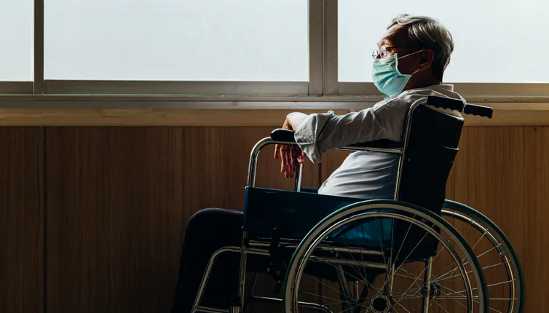While COVID-19 may itself compromise a person’s mental health, the social conditions of the pandemic are also having a negative impact. Economic hardship, heavy COVID-related media exposure, reduced social contact and domestic violence are just some factors that may have affected people.
Indeed, studies have shown that mental health has declined during the pandemic. Our recent research, which looks at how people across Europe fared during the first half of 2020, also suggests that this was the case. Specifically, we found that worsening mental health problems are linked to intensified loneliness.
Declines in mental health during the pandemic are not stable, but are sensitive to societal responses (lockdowns, restrictions, reopenings and so on). In Denmark, for example, mental health declined during the lockdown of the first wave, but improved as the Danish government gradually reopened society.
This makes our findings very relevant. Facing vast increases in COVID-19 cases, most European governments have reintroduced various restrictions, lockdowns, quarantines and social distancing measures to attempt to contain the virus. This will likely affect how lonely people feel and, consequently, their mental health.
Get The Latest By Email
Worsening mental health
In our study, we looked at people aged 50 and older from 26 European countries. We used data collected as part of a large ongoing study called the Survey of Health, Ageing and Retirement in Europe. The information was collected through telephone-based interviews between June and August 2020. A total of 50,609 survey participants were included.
We focused particularly on the extent to which people had experienced worsening mental health problems (depressed mood, anxiety symptoms, sleep problems) and loneliness, as well as the link between them.
We found that about 30% of respondents reported experiencing depressed mood, and a similar amount of respondents reported experiencing anxiety symptoms and sleep problems. Among them, 64% of those experiencing depressed mood and 73% of those experiencing anxiety symptoms said that their symptoms had worsened during the pandemic. Of those experiencing difficulty sleeping, 35% said that their sleep problems had gotten worse.
In other words, the data suggests that the pandemic has led to deteriorating mental health in Europe. These numbers present a major challenge to future mental health planning, with healthcare demands predicted to grow exponentially for the duration of the pandemic – and possibly in the aftermath – without intervention and appropriate health and social care policies in place.
 Reduced opportunities for social contact during the pandemic have led to escalations in loneliness across Europe. Kristin Greenwood/Shutterstock
Reduced opportunities for social contact during the pandemic have led to escalations in loneliness across Europe. Kristin Greenwood/Shutterstock
Loneliness on the rise
We found that for many, loneliness was a key part of this deterioration. 29% of participants reported feeling lonely, and among those, 40% said that they had felt lonelier since the start of the outbreak compared to previously.
Such trends are not only observable among the older population whom we investigated. Other recent studies conducted using data from EU member states, northern and western European countries, the UK and the US have documented similar increases in loneliness and mental health problems among young adults and even students (who are not usually considered at risk for loneliness). In fact, older adults appear to be coping better during the pandemic than the young.
In our own research, our most striking finding was that worsened loneliness during the pandemic was associated with an extremely high risk of worsened mental health problems. For those whose loneliness had increased, there was a six- to ten-fold increase in risk for worsened depressed mood, anxiety symptoms and sleep problems.
Our analysis further showed that these associations were not accounted for by confounding factors, such as losing close family members, confidants or friends to COVID-19. They appear to be outcomes of the pandemic in general rather than a more direct consequence of the virus itself.
Although our results may seem discouraging, there are reasons to be optimistic – and also ways to move forward. Not everyone reported feeling lonelier since the outbreak of the pandemic. More than half of respondents (57%) reported no change in loneliness and a small amount (3%) actually reported feeling less lonely.
In a similar fashion, a sizeable amount of those reporting mental health problems said that there had been no change in their symptoms since the outbreak started (34% for depression, 27% for anxiety symptoms and 69% for sleep problems). A small group (roughly 2% of those reporting any of these mental health problems) reported a reduction in their symptoms.
How to tackle loneliness
What these numbers tell us is that escalations in loneliness and mental health problems are not inevitable during a pandemic, and there may be actions that can be taken to avoid them. Research is needed to identify pandemic-specific protective factors and to investigate what differentiates those that fare worse from those that fare better.
Interventions among at-risk groups are also needed mitigate loneliness and mental health problems. It is critical to raise awareness about what people themselves can do to enhance their own mental health and social wellbeing, for example by keeping active, connecting with others, and getting involved in meaningful challenges or causes.
 Connecting digitally is one way to socialise safely during the pandemic. fizkes/Shutterstock
Connecting digitally is one way to socialise safely during the pandemic. fizkes/Shutterstock
Social interaction may appear difficult if not impossible to engage in under pandemic conditions. But a little bit of creativity can go a long way in making socially distanced socialising possible (think drive-in cinemas or non-contact sports, such as golf or kayaking).
Finally, telephone-based or online activites – including digital games, peer-support groups or social networking – might have a lot to offer. Although it’s difficult to see the upside of a global disease outbreak, being forced to find new solutions for alleviating loneliness and mental health problems could well prove fruitful in the future and lead to progress that we would not otherwise achieve.
About The Authors
Ziggi Ivan Santini, Research Scientist in Mental Health, University of Southern Denmark and Ai Koyanagi, Research Professor in Life and Medical Sciences, ICREA
This article is republished from The Conversation under a Creative Commons license. Read the original article.
books_health


 Shutter.B/Shutterstock
Shutter.B/Shutterstock




